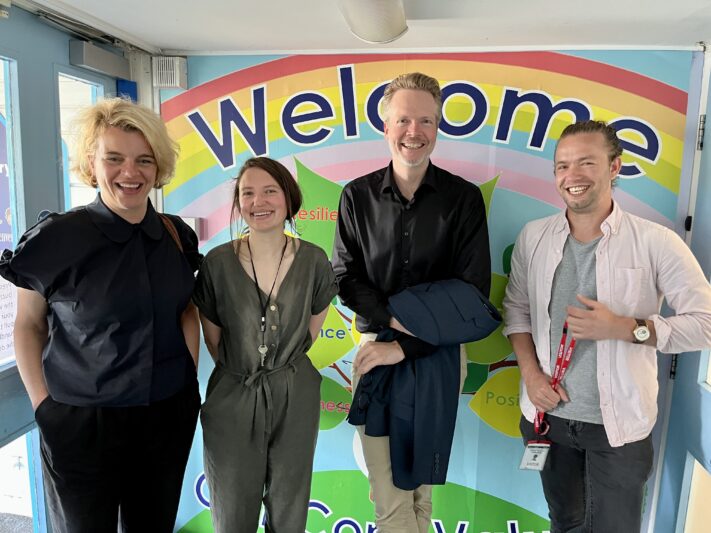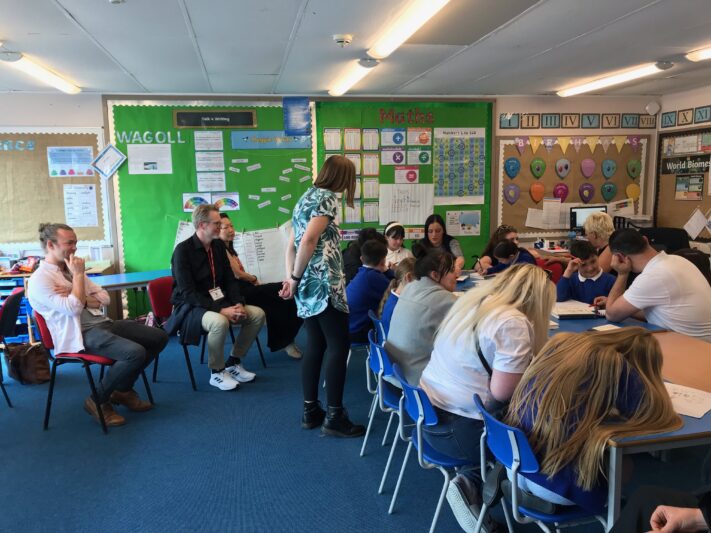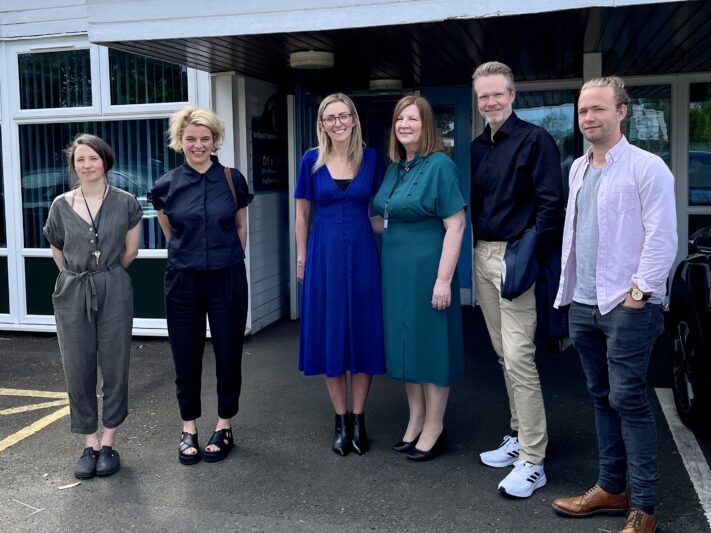Five years of building self-esteem through creative writing

With five years of support from Kavli Trust, New Writing North has engaged over 3,000 young people from disadvantaged backgrounds from North East England in creative writing activities to build confidence, self-esteem, and higher school attendance.
“It’s very fun to experience new writing things, finding new ways to enjoy writing. Writing doesn’t always have to be writing paragraphs and paragraphs of one subject; it can be so many things”, says Marwah, a Year 5 pupil at Kelvin Grove Primary School.
Marwah is quoted in an evaluation report from New Writing North, being one of the over 3,000 children and young people who have been engaged through the ‘Young Writers’ programme of creative writing over the past five years.

Kavli Trust and Kavli UK representatives sit in on a creative writing session at Larkspur Community Primary School in May 2023. Photo: NWN
Partners with professional writers
Since 2018, Kavli Trust has supported New Writing North to develop their Young Writers programme in Gateshead and Newcastle in the North East of England.
Young Writers introduces young people from socioeconomically disadvantaged and culturally diverse backgrounds to creative writing, defined broadly to include song writing, poetry, rap, scriptwriting, and podcasting.
The programme partners with local schools, and sessions are led by professional writers.
The evaluation report shows that, in the years from 2018 to 2022, New Writing North engaged over 545 young people in Gateshead and 680 in Newcastle through the Young Writers programme – with funding from Kavli Trust.
Alongside these more general programmes where everyone gets a chance to participate, they also run more targeted programmes where children are referred to the programme by teaching staff due to low literacy, learning difficulties or related behavioural issues.
All together over 3,000 young people from disadvantaged backgrounds from North East England have been engaged in creative writing activities to build confidence, self-esteem, and higher school attendance through the programme.
Increased self-confidence
Feedback and evaluation show that young people participating in creative writing sessions have learned to trust others when expressing their own ideas, have gained an increase in self-confidence, and are engaging with new ideas and cultural experiences. Schools report significant improvements in pupil engagement with education and self-expression via the targeted programme.
“Systemic inequalities mean that we focus our resources into engaging young people who have fewer opportunities to get involved in culture. The work we have done to date has proven incredibly successful in encouraging young people to share their stories, giving them the confidence to develop their artistic voice and improving their wider engagement in education”, Anna Disley, Executive Director (Programme & Impact) at New Writing North.
She adds that New Writing North is particularly proud of the work they have created with families that celebrates the diversity of Gateshead through multilingual creative writing and shared via a series of public events and online.

L-R: NWN Snr Programme Manager for Young People & Communities, Tess Denman-Cleaver; NWN Executive Director, Anna Disley; Deputy Head at Larkspur Community Primary School, Joanna Hall; Headteacher, Margaret Liddle; Grant Manager at Kavli Trust, Rune Mørland; and Brand Communications Manager at Primula Cheese/Kavli UK, Gareth Watson. Photo: Hanne Eide Andersen/Kavli Trust
Parents more involved
Rune Mørland is grant manager for the UK at Kavli Trust. He says that it has been a joy to follow the project for almost five years and see the positive results in line with the targets set out in the initial agreement with Kavli.
“We have grown very fond of the project and are excited to see how it makes a difference in children’s lives. Not only do pupils perform better in English, parents are also becoming more involved in their children’s school life. The attendance rate at parents’ meetings has increased significantly, and teachers are seeing increased participation in schools’ activities”, says Mørland.

Rune Mørland, Kavli Trust, and Gareth Watson, Primula Cheese/Kavli UK visiting one of NWN’s “Young Writers” projects in May 2023. Photo: Hanne Eide Andersen/Kavli Trust
“We are really happy with this project and how it contributes to the children’s lives”, Rune Mørland.
The high inflation and increased costs have intensified food poverty in Gateshead, but also led to increased substance misuse and negative social behaviour.
“New Writing North’s work is therefore extra important in giving children a safe arena and tools to express emotions, feel a sense of empowerment and have a voice in society”, says Rune Mørland.
This article first appeared on Kavlifondet.no.


